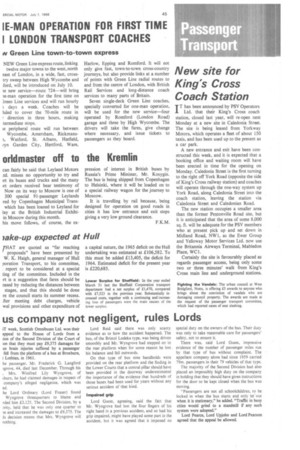us company not negligent, rules Lords
Page 47

If you've noticed an error in this article please click here to report it so we can fix it.
T week, Scottish Omnibuses Ltd. won their appeal to the House of Lords from a ion of the Second Division of the Court of ion that they must pay £9,375 damages for us brain injuries suffered by a passenger fell from the platform of a bus at Broxburn, t Lothian, in 1961.
he passenger, Mr. Frederick G. Langford igrove, 44. died last December. Through his . Mrs. Winifred Lily Wyngrove, of (burn, he had claimed damages in 'respect of company's alleged negligence, which was ed.
he Lord Ordinary (Lord Fraser) found Wyngrove threequarters to blame and rded him 0,125. The Second Division, by a Jrity. held that he was only one quarter to le and increased the damages to £9,375. The Is decision means that Mrs. Wyngrove will nothing. Lord Reid said there was only scanty evidence as to how the accident happened. The bus, of the Bristol Lodeka type, was being driven smoothly and Mr. Wyngrove had stepped on to the rear platform when for some reason he lost . his balance and fell outwards.
On that type of bus nine handholds were provided on the rear platform and the finding in the Lower Courts that a central pillar should have been provided in the doorway underestimated the importance of the evidence that hundreds of those buses had been used for years without any serious accident of that kind.
Impaired grip
Lord Guest, agreeing, said the fact that Mr. Wyngrove had lost the four fingers of his right hand in a previous accident, and so had his grip impaired, might have played some part in the accident, but it was agreed that it imposed no special duty on the owners of the bus. Their duty was only to take reasonable care for passengers' safety, not to ensure it.
There was, said Lord Guest, impressive evidence of the number of passenger miles run by that type of bus without complaint. The appellant company alone had since 1959 carried 79m. passengers in their 79 vehicles of that type.
The majority of the Second Division had also placed an impossibly high duty on the company in holding that they should have given instructions for the door to be kept closed when the bus was moving.
-Passengers are not all schoolchildren, to be locked in when the bus starts and only let. out when it is stationary," he added. "Traffic in busy cities would grind to a standstill if any such system were adopted."
Lord Pearce, Lord Upjohn and Lord Pearson agreed that the appeal be allowed.




























































































































